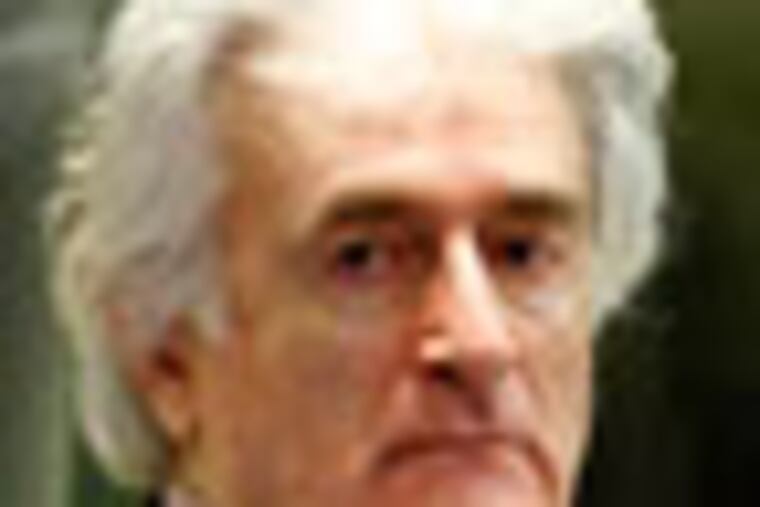Ex-Bosnian Serb leader cleared of genocide count
THE HAGUE, Netherlands - The Yugoslav war-crimes tribunal acquitted former Bosnian Serb leader Radovan Karadzic of one charge of genocide Thursday but upheld 10 other counts related to atrocities in Bosnia's bloody war.

THE HAGUE, Netherlands - The Yugoslav war-crimes tribunal acquitted former Bosnian Serb leader Radovan Karadzic of one charge of genocide Thursday but upheld 10 other counts related to atrocities in Bosnia's bloody war.
While the decision was a setback for prosecutors and angered survivors in Bosnia, the 10 pending charges against Karadzic include another genocide count covering his alleged involvement in the 1995 Srebrenica massacre of 8,000 Muslim men and boys.
The charge that was dismissed Thursday covered the mass killings, expulsions, and persecution by Serb forces of Muslims and Croats from Bosnian towns early in the country's 1992-95 war, which left 100,000 dead. Presiding Judge Oh-Gon Kwon said prosecutors did not provide enough evidence to "be capable of supporting a conviction of genocide in the [Bosnian] municipalities."
At the halfway stage of Karazdic's long-running trial, judges said there was enough evidence to uphold charges including murder and persecution in the early stages of the war, but the killings did not rise to the level of genocide, which requires prosecutors to prove intent to wipe out a specific group in whole or part.
Prosecutors finished presenting their evidence in May and this month Karadzic had asked judges to dismiss all 11 counts, saying prosecutors had failed to prove their case. Karadzic's lawyer, Peter Robinson, welcomed Thursday's rejection of the genocide charge.
"Dr. Karadzic and myself both thought it was a courageous decision of the trial chamber to say at this stage of the case that there was no genocide in the municipalities in Bosnia in 1992," Robinson said outside the court. "But I do expect that the prosecution will want to appeal this decision."
Prosecutors had no immediate reaction. But survivors of the war said the decision could set back any reconciliation.
"We are shocked and disappointed," said Edin Ramulic, who heads an association of victims in Bosnia's Prijedor region. "We have no reason to hope now that the Serbs will go through catharsis and acknowledge that the non-Serbs in Prijedor had been killed, tortured, exterminated, raped."
Lara J. Nettelfield, a lecturer in International Relations at the University of Exeter in Britain who has written a book about the tribunal, called the ruling by the court disappointing but not surprising. "Judges [at the tribunal] have consistently refused to support the prosecution's charge of genocide anywhere but in Srebrenica," Nettelfield said.
The court has repeatedly ruled that the massacre in Srebrenica was genocide, but has never convicted anyone of genocide for the killings in the Bosnia towns and villages at the outset of the war.
"The decision also represents a huge disappointment for survivors in those municipalities and anyone who held out hope that the court . . . would leave behind a body of decisions that corresponded to lived experience there," Nettelfield added.
Residents of Karadzic's wartime stronghold of Pale were delighted to hear that one charge was removed from the indictment of the man they consider a wartime hero.